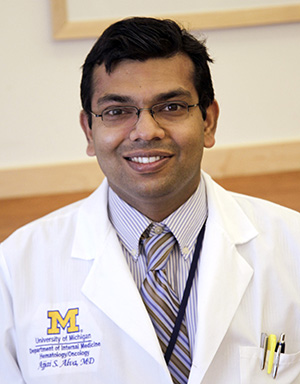November 3, 2020:
 This month, the Big Ten Cancer Research Consortium highlights the University of Michigan Rogel Cancer Center as our featured member. Rogel Cancer Center member Ajjai Alva, MBBS, is an associate professor of hematology/oncology and member of the Big Ten CRC’s Genitourinary Clinical Trial Working Group. He has participated in four Big Ten CRC trials with a few more in the pipeline. Dr. Alva shares why he is glad to be part of the Big Ten Cancer Research Consortium.
This month, the Big Ten Cancer Research Consortium highlights the University of Michigan Rogel Cancer Center as our featured member. Rogel Cancer Center member Ajjai Alva, MBBS, is an associate professor of hematology/oncology and member of the Big Ten CRC’s Genitourinary Clinical Trial Working Group. He has participated in four Big Ten CRC trials with a few more in the pipeline. Dr. Alva shares why he is glad to be part of the Big Ten Cancer Research Consortium.
“Cancer Research is evolving rapidly with major new advances and that’s great news for patients. From a researcher perspective, the fast-changing landscape makes it critical to get new trials up and running fast and to get them completed fast as well. Otherwise, we run a real risk of the study being outdated and irrelevant. The consortium provides a great platform of outstanding experienced institutions and investigators to do cutting-edge and fast-paced studies. The Administrative Headquarters team is outstanding, highly professional, and very responsive to site and investigator needs and ever ready to assist.
“Another important aspect is that the Big Ten CRC provides wonderful opportunities to collaborate with our peers at all stages of concept and protocol development and execution. Several of them have become steadfast friends and colleagues.
“I see a lot of potential in GU cancers with outcomes in urothelial cancer and kidney cancer having dramatically improved with immune checkpoint inhibitors over the past 1-2 decades. The more recent wave that has been very promising has been antibody drug conjugates, which have shown efficacy in multiple cancer types including bladder cancer. We have also seen encouraging results with radiopharmaceuticals like Lutetium-177 conjugated small molecules and antibodies in advanced prostate cancer in even heavily treated patients.
“While GU cancer outcomes have improved in general, clinical research that makes these improvements possible faces several daunting challenges including the COVID-19 pandemic. The Big Ten CRC offers solutions to some of these challenges. Single-site studies are largely a relic of the past. I am so glad that the University of Michigan is part of the Big Ten CRC network.”
About the Big Ten Cancer Research Consortium: The Big Ten Cancer Research Consortium was created in 2013 to transform the conduct of cancer research through collaborative, hypothesis-driven, highly translational oncology trials that leverage the scientific and clinical expertise of Big Ten universities. The goal of the Big Ten Cancer Research Consortium is to create a unique team-research culture to drive science rapidly from ideas to new approaches to cancer treatment. Within this innovative environment, today’s research leaders collaborate with and mentor the research leaders of tomorrow with the unified goal of improving the lives of all patients with cancer.
About the Big Ten Conference: The Big Ten Conference is an association of world-class universities whose member institutions share a common mission of research, graduate, professional and undergraduate teaching and public service. Founded in 1896, the Big Ten has sustained a comprehensive set of shared practices and policies that enforce the priority of academics in the lives of students competing in intercollegiate athletics and emphasize the values of integrity, fairness and competitiveness. The broad-based programs of the 14 Big Ten institutions will provide over $200 million in direct financial support to more than 9,800 students for more than 11,000 participation opportunities on 350 teams in 42 different sports. The Big Ten sponsors 28 official conference sports, 14 for men and 14 for women, including the addition of men’s ice hockey and men’s and women’s lacrosse since 2013. For more information, visit www.bigten.org.
















Subscribe to the Big Ten CRC Newsletter X
X Facebook
Facebook YouTube
YouTube